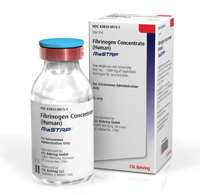Product
RiaSTAP
Approval Date
Jan. 16, 2009
Release Date
Now available
Company
CSL Behring
Class
Clotting factor (Factor I)
Indication
The first and only treatment of acute bleeding episodes in patients with congenital fibrinogen deficiency, including afibrinogenemia and hypofibrinogenemia.
Active Ingredient
Purified fibrinogen concentrate
Agency Roster
GSW Worldwide
Draftfcb
The Hal Lewis Group
Also in the Pipeline (courtesy of Adis R&D Insight)
No competitor compounds in phase III or pre-registration, US.
Clinical Trials
The pharmacokinetic study evaluated the single-dose PK and maximum clot firmness (MCF) in subjects with afibrinogenemia. MCF was determined by thromboelastometry (ROTEM) testing. MCF was measured to demonstrate functional activity of replacement fibrinogen when a fixed dose of RiaSTAP was administered. Clot firmness is a functional parameter that depends on: activation of coagulation, fibrinogen content of the sample and polymerization/crosslinking of the fibrin network. Thromboelastometry has been shown to be a functional marker for the assessment of fibrinogen content and for the effects of fibrinogen supplementation on clinical efficacy. For each subject, the MCF was determined before (baseline) and one hour after the single dose administration of RiaSTAP. RiaSTAP was found to be effective in increasing clot firmness in patients with congenital fibrinogen deficiency (afibrinogenemia) as measured by thromboelastometry. The study results demonstrated that the MCF values were significantly higher after administration of RiaSTAP than at baseline. The mean change from pre-infusion to 1 hour post-infusion was 8.9 mm in the primary analysis (9.9 mm for subjects < 16 years old and 8.5 mm for subjects = 16 to < 65 years old). The mean change in MCF values closely approximated the levels expected from adding known amounts of fibrinogen to plasma in vitro. Hemostatic efficacy in acute bleeding episodes, and its correlation with MCF, is being verified in a post marketing study.
Adverse Reactions
Adverse reactions reported in patients receiving RiaSTAP for treatment of fibrinogen deficiency include allergic-anaphylactic reactions (including rash, dyspnea, etc.), general reactions such as chills, fever, nausea, vomiting and thromboembolic complications such as myocardial infarction, pulmonary embolism, and deep vein thrombosis.
Contraindications
Anaphylactic or severe reactions to RiaSTAP or its components
Precautions
Thrombotic events have been reported in patients receiving RiaSTAP. Weigh the benefits of administration versus the risks of thrombosis. RiaSTAP is made from pooled human plasma. Products made from human plasma may contain infectious agents, e.g., viruses and, theoretically, the Creutzfeldt-Jakob disease (CJD) agent.









